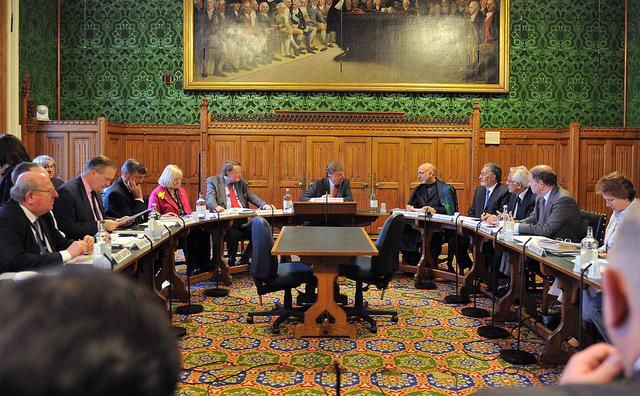Incorrect assumptions about bill committees can damage perceptions of the policy influencing power of Parliament
Bill committees play a crucial role in the scrutiny of government legislation, yet they have traditionally been overlooked by academics and journalists in favour of the more newsworthy aspects of parliamentary scrutiny. In this article, Louise Thompson challenges the myths about bill committees that have developed from the lack of interest.

Credit: Catherine Bebbington/Parliamentary copyright
If someone asked you to tell them about committees in the House of Commons what would you tell them? Chances are you would talk about the select committee system. You might point to things like the Treasury Select Committee’s tough questioning of HSBC’s Chairman and Chief Executive or the Public Account’s Committee’s grilling of Google bosses Matt Brittin last month (during which he confessed that he did not know how much he was paid). You probably wouldn’t start to talk about the 17 MPs who sat on the Driving Instructors (Registration) Bill Committee or the High Speed Rail (London-West Midlands) Bill Committee last week. For these public bill committees aren’t usually given much attention, and most people don’t know very much about them. In academic literature these ad hoc committees are presented as highly partisan arenas in which there is little or no constructive debate. You may have heard stories about government MPs being told to bring their Christmas cards along to sign. Anything to stop them from actually talking and holding up the government’s business. But if you knew more about what goes on inside the confines of a bill committee room, then perhaps you would start to talk more about public bill committees too.
Myth 1: MPs appointed to bill committees can’t scrutinise the bill in question because they often know nothing about it.
Most of us know that MPs are appointed to bill committees by the Committee of Selection, something which is described as ‘a clearing house’ for lists drawn up by the party whips. This means that the government backbenchers appointed to a committee will usually be those who support the bill (or perhaps more accurately those who will not vote against it). Conservative MP Sarah Wollaston wrote in The Guardian about her experiences scrutinising the government’s Health and Social Care Bill in 2011. She was shocked that she was discouraged from tabling amendments and described her colleagues on the committee as having “no experience or even recorded interest in health and social care”. How then could we expect MPs to be able to properly scrutinise legislation?
Thankfully, there is also evidence that MPs with a great deal of knowledge are also regularly appointed to bill committees. On average nearly two thirds of MPs appointed to scrutinise a bill in committee will have some form of relevant experience or knowledge of the policy in question. This may be knowledge they have acquired through their career outside Parliament, or through ministerial or select committee positions inside Parliament. In one Local Government bill committee, the government minister noted that the MPs sitting with him had so many years of experience working in local government that they made Brian Lara’s cricket scores ‘look rather low’.
Myth 2: Committee stage makes no difference to government legislation
Confusion about the knowledge and experience of bill committee members is a problem for the reputation of the committee system, but the notion that committee stage makes no difference to government bills is much more worrying. Writing about the committee stage of the Marriage (Same Sex Couples) Bill for instance, Mark D’Arcy noted that “nothing at all in the bill has been changed. Nothing at all. Zip. Nada.” In some respects D’Arcy was right. If no amendments are formally accepted by the government minister during a committee sitting, it looks like the committee has done nothing at all. Ministers don’t tend to accept amendments like this. In fact, of over 17,000 amendments moved by backbench MPs between 2000 and 2010 only 88 changes like this were actually made to bills. And most of these were very tiny (including some which simply changed spelling mistakes).
But saying that bill committees don’t do anything actually overlooks a huge part of their job. Firstly, it ignores changes that are made to the regulations or codes of conduct which accompany bills. These documents outline precisely how bills will work and so changes to these are important. Secondly, it ignores the fact that government ministers often look at the changes being suggested by MPs and incorporate them into bills themselves either right before or during committee stage. This allows them to quash opposition to certain parts of a bill. Finally, it ignores what happens after the end of a bill committee. Ministers don’t walk out of a committee room and never think about their bill again. They will follow up on things that MPs have said during the committee stage and this can (and does) lead to changes. Take the Crime and Security Bill (2009-10) for instance. Conservative backbencher Andrew Rosindell was appointed to the bill committee. He noticed that the bill banned prisoners from having mobile phones, but thought it was strange that the wording didn’t ban any other electronic communication devices. So he moved an amendment during the committee stage to suggest a change in the wording of the bill. The government minister didn’t accept it, but he did say that he would think about it further. When the bill went back to the floor of the House of Commons for its report stage the minister moved an amendment to replace the word ‘mobile telephones’ with ‘electronic communications devices’. It passed. And so the change suggested by Andrew Rosindell was finally made. A government bill was changed as a direct result of the action taken by a backbench MP in committee. We simply didn’t find out the end result during committee stage itself.
Looking at that 2000-2010 period again, we could say that:
- Bill committees were responsible for over 125 changes to regulations and codes of conduct.
- Ministers made 193 changes to their own bills right before or during their committee stage, in response to amendments by committee members.
- Over 1,400 changes were made to bills at report, in response to discussions or amendments put forward during committee stage.
If we quantify these changes then, we could say that over 1700 changes were made to government bills over this period thanks to its scrutiny in committee. This paints a much better and more realistic impression of committee stage than we would otherwise have thought. Perhaps we need to rethink our views about bill committees and begin to see them as strong scrutinisers of legislation. We may also begin to rethink our perceptions of the way that scrutiny works in Parliament. For its complexity means that committee stage should not be discussed in isolation. Rather, it should be seen as one part of a much larger train of scrutiny; one which stretches across the House of Commons and the House of Lords. By doing so, bill committees become a much more valuable and effective scrutinisers of government legislation.
—
This post represents the views of the author and not those of Democratic Audit. Please read our comments policy before posting.
—
 Louise Thompson is Lecturer in British Politics at the University of Surrey. Her article ‘Debunking the Myths of Bill Committees in the British House of Commons’ is published in the current issue of Politics. She is the author of Making British Law: Committees in Action (Palgrave 2015) and tweets @louisevthompson.
Louise Thompson is Lecturer in British Politics at the University of Surrey. Her article ‘Debunking the Myths of Bill Committees in the British House of Commons’ is published in the current issue of Politics. She is the author of Making British Law: Committees in Action (Palgrave 2015) and tweets @louisevthompson.





 Democratic Audit's core funding is provided by the Joseph Rowntree Charitable Trust. Additional funding is provided by the London School of Economics.
Democratic Audit's core funding is provided by the Joseph Rowntree Charitable Trust. Additional funding is provided by the London School of Economics.
Incorrect assumptions about bill committees can damage perceptions of the policy influencing power of Parliament https://t.co/FWcrhqzRV4
Incorrect assumptions about bill committees can damage perceptions of the policy influencing power of Parliament https://t.co/0uDVYDOR4r
Incorrect assumptions about bill committees – debunking the myths by @LouiseVThompso, world expert on PBCs https://t.co/Jf9SOtYxjF
RT @DanielGover: Good stuff by @LouiseVThompson, busting myths about Commons public bill cttees (& if anyone knows PBCs it’s Louise!) https…
… [Trackback]
[…] Here you can find 17874 additional Informations: democraticaudit.com/?p=20285 […]
Assumptions about bill committees can damage perceptions of Parliament https://t.co/3f3EqARO5B Interesting article and some good links.
Incorrect assumptions about bill committees can damage perceptions of the policy influencing power of Parliament https://t.co/HmHLQ22Oxi
Incorrect assumptions about bill committees can damage perceptions of the policy influencing power of Parliament https://t.co/t3fGYuhf5k
Incorrect assumptions about bill committees can damage perceptions of the policy… https://t.co/oEr5zyJoXQ https://t.co/LmD8GZNGMY